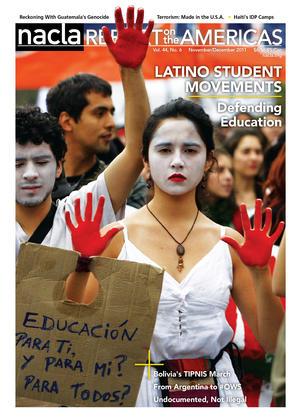Latino Student Movements: Defending Education

Across the Americas conservative politicians are gutting education and raising student fees, co-opting legislation and banning intercultural classes. But Latino student movements are fighting back. For months in Chile thousands of students have taken to the streets to demand free universal education and an end to the leftover neoliberal policies of Chilean dictator Augusto Pinochet. Over the last two years, despite brutal police violence, California university students have occupied campuses and rallied against hefty tuition hikes and austerity measures. In Tucson, Arizona, high school students have stood up to save their beloved Mexican American Studies program. Across the United States, the undocumented youth movement is increasingly using direct action to bring attention to broader issues of immigrant, civil, and human rights. This NACLA Report gives voice to Latino student movements across the region that are standing up to the crises, cutbacks, and repression.
